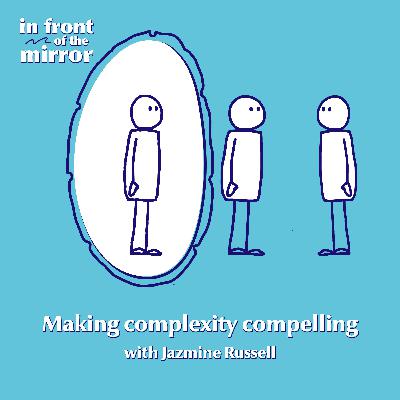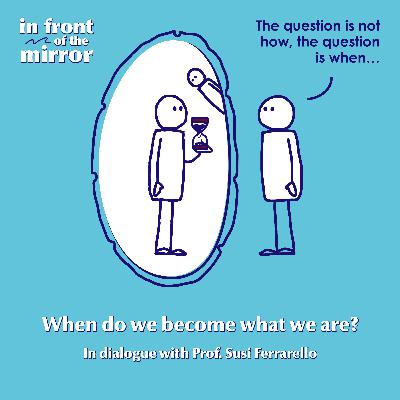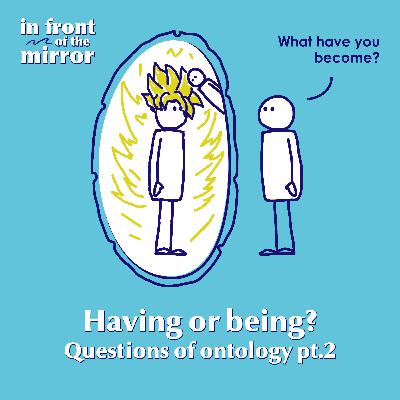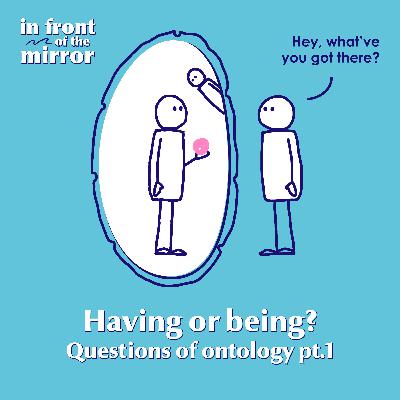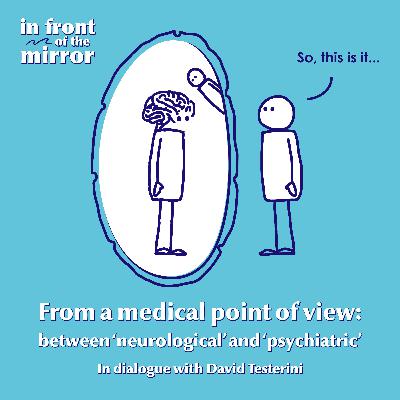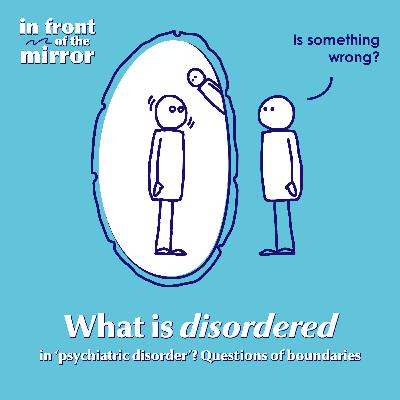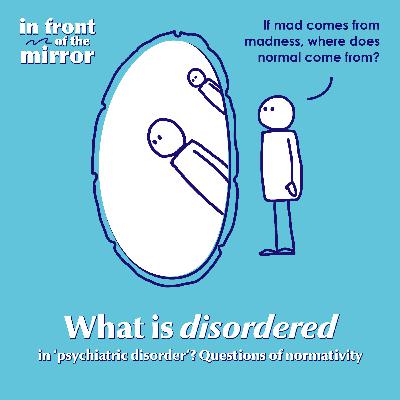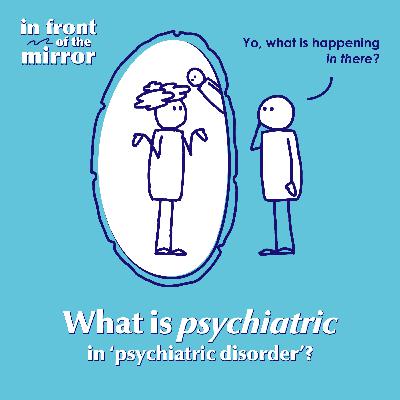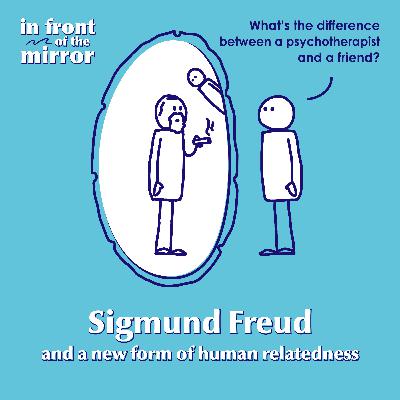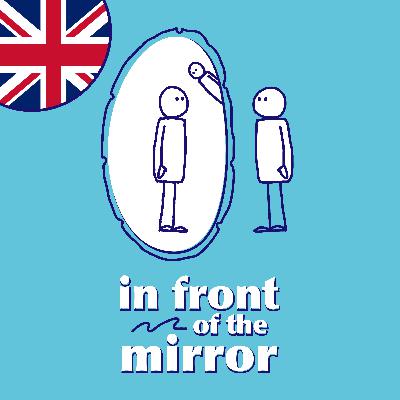Discover In Front of the Mirror - The English Podcast
In Front of the Mirror - The English Podcast

In Front of the Mirror - The English Podcast
Author: Cristiano Bacchi, Giacomo Piselli Fioroni
Subscribed: 3Played: 5Subscribe
Share
© Cristiano Bacchi, Giacomo Piselli Fioroni
Description
Is a philosophy of mental health possible? And what would it look like?
Let’s join together and reflect, in front of the mirror.
About us:
Hello, we’re Giacomo and Cristiano!
We are Master’s students in philosophy and cognitive sciences, at the ‘Berlin School of Mind and Brain’, Humboldt Universität zu Berlin.
Giacomo strives for pursuing a path as a philosopher of mind and mental health.
Cristiano dreams of becoming a psychotherapist, one day.
Together, we’re committed to cultivating this dialogue, between philosophy and mental health, which has become our mission, and our passion.
Let’s join together and reflect, in front of the mirror.
About us:
Hello, we’re Giacomo and Cristiano!
We are Master’s students in philosophy and cognitive sciences, at the ‘Berlin School of Mind and Brain’, Humboldt Universität zu Berlin.
Giacomo strives for pursuing a path as a philosopher of mind and mental health.
Cristiano dreams of becoming a psychotherapist, one day.
Together, we’re committed to cultivating this dialogue, between philosophy and mental health, which has become our mission, and our passion.
17 Episodes
Reverse
The DSM is the Diagnostic and Statistical Manual of Mental Disorders. Some have described it as the “bible of psychiatry.” And, much like the Bible – or a constitution – it feels like one of those texts that quietly shape our society, and our lives, whether we’ve actually read it or not. Its vocabulary slips into our everyday conversations. Its descriptions help form the concepts we use to understand ourselves and others. In short, reading it, understanding it, and maybe even criticizing it, seems almost mandatory.So today we want to ask: what do we actually find inside this manual? What principles guide it? And how can we reflect on it?Every other Monday, at 12pm.Follow us on:Instagram: mirror_podcast_Substack: In front of the mirrorThis project exists in Italian as well: In Front of the Mirror - Il Podcast in italianoReferences:Rossi Monti, M. (2016). Manuale di psichiatria per psicologi. Carocci Editore.
When we say diagnosis, we’re talking about medicine. When we say health, we’re still talking about medicine. So then - when do we get to talk about psychology?It often feels impossible to talk about mental health without using medical language. Even the words we choose - like “disorders” - show it.Today we’re asking: is all of this a good thing or a bad thing? What impact does diagnosis really have on our lives?Every other Monday, at 12pm.Follow us on:Instagram: mirror_podcast_Substack: In front of the mirrorThis project exists in Italian as well: In Front of the Mirror - Il Podcast in italianoReferences:Lingiardi, V. (2018). Diagnosi e destino. Einaudi.Rose Cartwright's piece: The Guardian - I was the poster girl for ocd then I began to question everything I'd been told about mental illness
Sooner or later, in life, we have all received a diagnosis.An expert comes to us, or we go to them, and they utter some words that can sometimes change the course of our lives, for better or for worse.Words like “cold,” “gastritis,” “sore throat,” “ADHD,” or “major depression.” Well then, what do these words have in common? Why do we call all of them “diagnoses”?Every other Monday, at 12pm.Follow us on:Instagram: mirror_podcast_Substack: In front of the mirrorThis project exists in Italian as well: In Front of the Mirror - Il Podcast in italianoReferences:Hacking, I. (1995). The looping effects of human kinds. In D. Sperber, D. Premack, & A. J. Premack (Eds.), Causal cognition: A multidisciplinary debate (pp. 351–394). Clarendon Press/Oxford University Press.Lingiardi, V. (2018). Diagnosi e destino. Einaudi.Lingiardi, V. (2021). Arcipelago N. Variazioni sul narcisismo. Einaudi.Sadler, J. Z. (2004). Diagnosis/antidiagnosis. In J. Radden (Ed.), The philosophy of psychiatry: A companion (pp. 163–179). Oxford University Press
It's Christmas. We are all very tired.Today, we are bringing you a special episode: we talk about ourselves, our paths, and how we got here.Every other Monday, at 12pm.Follow us on:Instagram: mirror_podcast_Substack: In front of the mirrorThis project exists in Italian as well: In Front of the Mirror - Il Podcast in italiano
The possibility of being offered and exposed to a multiplicity of frameworks reflects and respects the complex nature of mental health phenomena. Rather than finding themselves encapsulated within the neat confines of only one narrative, the person would benefit from choosing and adopting one or more stories and narratives that make sense to them. In light of this, we ask: are there frameworks that do more good than others? To what extent should the clinician guide, direct, or even impose particular narratives? Can the epistemic significance of a symptom be overlooked or misinterpreted?In the attempt to make complexity compelling, we are joined for the second time by Jazmine Russell, who is a mental health educator, writer, and interdisciplinary scholar focused on bridging mental health, mind-body healing, and societal change. She is the co-founder of the Institute for the Development of Human Arts, a transformative mental health training institute and the founder & host of the Depth Work Podcast. Drawing on her lived experiences and professional training working both within and outside the mental health system, Jazmine is a holistic counselor and trauma-informed holotropic breathwork practitioner. She co-edited the Mad Studies Reader: Interdisciplinary Innovations in Mental Health (Routledge, 2024). Find her work at www.depth-work.com and www.JazmineRussell.comEvery other Monday, at 12pm.Follow us on:Instagram: @mirror_podcast_This project exists in Italian as well: In Front of the Mirror - Il Podcast in Italiano
Mental health crises might be investigated from a variety of perspectives. The lived experience of mental health conditions can be considered an irreplaceable source of knowledge. It is through lived experience that we become aware of aspects that are often neglected, such as the ways our bodies try to communicate with us and alert us, or how our personal histories are revealed to us through the very phenomena we tend to call "symptoms".Jazmine Russell is a mental health educator, writer, and interdisciplinary scholar focused on bridging mental health, mind-body healing, and societal change. She is the co-founder of the Institute for the Development of Human Arts, a transformative mental health training institute and the founder & host of the Depth Work Podcast. Drawing on her lived experiences and professional training working both within and outside the mental health system, Jazmine is a holistic counselor and trauma-informed holotropic breathwork practitioner. She co-edited the Mad Studies Reader: Interdisciplinary Innovations in Mental Health (Routledge, 2024). Find her work at www.depth-work.com and www.JazmineRussell.comEvery other Monday, at 12pm.Follow us on:Instagram: @mirror_podcast_This project exists in Italian as well: In Front of the Mirror - Il Podcast in Italiano
What are hallucinations, depressive episodes, or panic attacks?We know what they are, of course - psychiatric symptoms. The problem is that we don’t know what they are - ontologically.Which is to say: are they the manifestations of a compromised neurobiological mechanism? Or perhaps phenomena carrying a meaning to be deciphered? Adaptive strategies, defense mechanisms?The ninth episode is a philosophical inquiry into the nature of psychiatric symptoms and the power of the conceptual lenses we wear to understand them.ReferencesEagle, M. N. (2011). From classical to contemporary psychoanalysis: A critique and integration. Routledge.Ritunnano, R., Humpston, C., & Broome, M. R. (2022). Finding order within the disorder: A case study exploring the meaningfulness of delusions. BJPsych Bulletin, 46(2), 109–115. https://doi.org/10.1192/bjb.2020.151Russell, J. (2024). How delusions can uncover sources of harm and pathology: The epistemic value of interoceptive & unconscious information. Philosophy and the Mind Sciences, 5. https://doi.org/10.33735/phimisci.2024.11490Every other Monday, at 12pm.Follow us on:Instagram: @mirror_podcast_This project exists in Italian as well: In Front of the Mirror - Il podcast in Italiano
The question of all questions: What do we mean when we say that therapy brings about change?Then, if there are different types of therapy, are there also different kinds of change?And furthermore, when it comes to the person - "who" is changing? And, where should we start if we want to build the sense a person has of being themselves? References:Kellog S., Torres A. (2021) Chairwork invites you to shift perspective on who you are. Aeon Kiverstein J, Rietveld E, Denys D. (2021) World Wide Open. AeonRossi Monti M. (2016) Manuale di psichiatria per psicologi. Carocci Editore.Rosfort, R., & Stanghellini, G. (2015). The Patient as an Autonomous Person: Hermeneutical Phenomenology as a Resource for an Ethics for Psychiatrists . In J. Z. Sadler, W. van Staden, & KWM. Fulford (Eds.), Oxford Handbook of Psychiatric Ethics (Vol. 1, pp. 319-335). Oxford https://doi.org/10.1093/oxfordhb/9780198732365.013.26Every other Monday, at 12pm.Follow us on:Instagram: @mirror_podcast_This project exists in Italian as well: In Front of the Mirror - Il Podcast in Italiano
When do we become who we are? What makes me the person I am, and not someone else?How far back should we go, to find that out?And what does it mean to embrace our destiny, to own our story?Today we are thrilled to discuss these topics with Susi Ferrarello, philosopher, Professor at California State University, East Bay, and philosophical counsellor.Susi's book: Ferrarello, S. (2024). The Phenomenology of Pregnancy and Early Motherhood: Ethical, Social, and Psychological Perspectives (1st ed.). Routledge.Other references:Ammaniti, M., & Gallese, V. (2014). The birth of intersubjectivity: Psychodynamics, neurobiology, and the self. W. W. Norton & Company.Beebe, B., & Steele, M. (2013). How does microanalysis of mother–infant communication inform maternal sensitivity and infant attachment? Attachment & Human Development, 15(5–6), 583–602. https://doi.org/10.1080/14616734.2013.841050Hillman, J. (1996)The Soul’s Code: In Search of Character and Calling.
It has even been said that depression, anorexia, and phobia are not something we ‘have’, rather they are modes of being of the person. But what does ‘being’ depressed, anorexic, or phobic mean?It has even been said these pathologies do not happen to the person, they are worlds instead, which persons inhabit. So: one does not have autism, one is autistic. Or, at least, this is what they say.It has even been said that one has become schizophrenic, as if it were the culmination of a personal, and unique trajectory. But, which formulations can make justice to the lived experience of the person?In this episode Cristiano will be the spokesperson of the “being” formulation. But Giacomo has got some objections.So: does one have a mental illness, or should we rather say that one is mentally ill? If the titles didn’t make it clear enough, this debate is our focus for this, and the last episode.ReferencesBollas, C. (2015). When the sun bursts: the enigma of schizophrenia. Yale University Press.Carrère. E. (2011) Lives Other Than My Own: A MemoirLaing, R. D. (1960) The divided self: An existential study in sanity and madness. Penguin BooksLingiardi, V., & McWilliams, N. (Eds.). (2017). Psychodynamic diagnostic manual: PDM-2 (2nd ed.). The Guilford Press.Stanghellini, G., Broome, M. R., Fernandez, A. V., Fusar-Poli, P., Raballo, A., & Rosfort, R. (Eds.). (2019). Oxford handbook of phenomenological psychopathology. Oxford University Press. https://doi.org/10.1093/oxfordhb/9780198803157.001.0001A video adaptation produced by the World Health Organization (2012), based on Matthew Johnstone’s book (2005). I had a black dog, his name was depressionEvery other Monday, at 12pm.Follow us on:Instagram: @mirror_podcast_This project exists in Italian as well: In Front of the Mirror - Il Podcast in Italiano
One says that depression, anorexia and phobia is something we ‘have’, and ‘suffer from’. But what does ‘having’ a psychiatric condition mean?One says these pathologies happen to the person, and are foreign to them. So: one is not autistic, one has autism. Or, at least, this is what they say.One says that this formulation is first and foremost a moral conquest. In assuming so, we stop blaming the person. But can this really alleviate the stigma?In this episode Giacomo will be the spokesperson of the “having” formulation. But Cristiano has got some objections.So: does one have a mental illness, or should we rather say that one is mentally ill? If the title didn’t make it clear enough, this debate will be our focus for this, and the next episode.References:Laing, R. D. (1960) The divided self: An existential study in sanity and madness. Penguin BooksSass, L. A. (2007). `Schizophrenic Person’ or `Person with Schizophrenia’? An Essay on Illness and the Self. Theory & Psychology, 17(3), 395-420. https://doi.org/10.1177/0959354307073152 Sapolsky’s video on the neurobiology of depression:https://www.youtube.com/watch?v=NOAgplgTxfc14 years later, Sapolsky has updated his lecture.Link to the new version:https://www.youtube.com/watch?v=fzUXcBTQXKMEvery other Monday, at 12pm.Follow us on:Instagram: @mirror_podcast_This project exists in Italian as well: In Front of the Mirror - Il Podcast in Italiano
"Is this pathology neurological or psychiatric?". Physicians often wonder about it. How can they identify and distinguish between these two categories?What if the two are entangled, as the case of organic pathologies with psychiatric symptoms shows?And since when are shoes part of psychiatric semeiotics?Today we are pleased to discuss these topics with David Tèstérini, physician and neurologist.About the guest:David Tèstérini holds a degree in medicine with a specialization in functional neurology, along with academic training in bioethics, philosophy, and epistemology. His studies at prestigious institutions across the USA, UK, Germany, and Italy demonstrate a diverse and globally informed perspective. His research critically examines the epistemological underpinnings of medical practice, investigating how knowledge in neuroscience and medicine is constructed, interpreted, and applied. Drawing on insights from neuroscience, phenomenology, and enactivism, he has also explored the complex interplay between consciousness, perception, cognition, motor function, and embodied experience, with a particular emphasis on the relationships among pain, movement, and cognitive processes. Grounded in postmodern epistemology, his work seeks to establish a transdisciplinary paradigm that integrates the connections between the brain, body, and lived experience. This approach ultimately aims to redefine how suffering is understood and engaged with across diverse fields of knowledge and practice.References:Dew, R. (2009) Why psychiatry is the hardest specialty. American Journal of Psychiatry.Milone, P. (2023) The Art of Binding People.Rossi Monti, M. (2024) Manuale di psichiatria per psicologi. Carocci Editore.-Every other Monday, at 12pm.Follow us on:Instagram: @mirror_podcast_Twitter/𝕏: @mirror_podcastThis project exists in Italian as well: In Front of the Mirror - Il Podcast in Italiano
What makes a pattern of behavior, thinking and feeling a disorder, a pathology?Is it the presence of a dysfunction, suffering, a conflict with societal norms?Can these criteria truly demarcate what is defined as pathological from what is not?In this episode, Cristiano will scrutinize these very criteria, questioning them.This episode continues the analysis that Giacomo began in the previous one, between normality and normativity.References:Bortolotti, L. (2023). Why Delusions Matter. Bloomsbury PublishingButler, PV (2000)Reverse Othello syndrome subsequent to traumatic brain injury. Psychiatry. doi: 10.1080/00332747.2000.11024897.May, J. (2023). Neuroethics: Agency in the Age of Brain Science. New York, US: Oxford University Press.McKay R, Langdon R, Coltheart M. (2005) "Sleights of mind": delusions, defences, and self-deception. Cogn Neuropsychiatry. doi: 10.1080/13546800444000074.Münch R, Walter H and Müller S (2020) Should Behavior Harmful to Others Be a Sufficient Criterion of Mental Disorders? Conceptual Problems of the Diagnoses of Antisocial Personality Disorder and Pedophilic Disorder. Front. Psychiatry. doi: 10.3389/fpsyt.2020.558655Nesse RM, Stein DJ. (2012) Towards a genuinely medical model for psychiatric nosology. BMC Med. doi: 10.1186/1741-7015-10-5.Stanghellini, G. (2018). Metaphors of pathology. International Review of Psychiatry, 30(2), 140–152. https://doi.org/10.1080/09540261.2018.1444011The British Psychological Society. (2014). Understanding Psychosis and Schizophrenia.Institute for the Study of the Neurologically Typical: https://erikengdahl.se/autism/isnt/Downside Up | A short film by Peter Ghesquiere: https://www.youtube.com/watch?v=VNxO-wv3S9o-Every other Monday, at 12pm.Follow us on:Instagram: @mirror_podcast_Twitter/𝕏: @mirror_podcastThis project exists in Italian as well: In Front of the Mirror - Il Podcast in Italiano
When one claims that something or someone is normal, what do they mean?And when one claims that is not, normal?Could investigating what a norm is, or what a rule is, ever help us make sense of all of it?In this episode, Giacomo embarks on a journey through the concepts that underlie and support our idea of normality. In the next episode, Cristiano will continue by talking about boundaries.References:Carrère E. (1993). I am alive and you are dead. A journey into the mind of Philip K. Dick. Picador. Copp D. (2022). Normativity in Metaetichs. Stanford Encyclopidia of Philosophy.Vogt H. Hoffman B. Getz L. (2016). Personalized medicine: evidence of normativity in its quantitative definition of health. Springer.Wegwood R. (2018). The Unity of Normativity. The Oxford Handbookk of Reasons and Normativity. -Every other Monday, at 12pm.Follow us on:Instagram: @mirror_podcast_Twitter/𝕏: @mirror_podcastThis project exists in Italian as well: In Front of the Mirror - Il Podcast in Italiano
When one claims that a disorder is psychiatric:What is the intrinsic nature of this adjective? What makes some kinds of experiences psychiatric, instead of something else? And, in what way do these experiences affect the person who goes through them?References:de Haan, S.(2020). Enactive Psychiatry. Cambridge University Press.Dennett, D. C. (2013). Intuition pumps and other tools for thinking. Penguin Books.Freud, S. (1940). An outline of psycho-analysis. The International Journal of Psychoanalysis.Kandel, E.R. (2018). The disordered mind. What unusual brains tell us about ourselves. Robinson press. Schwarz, R.C. Sweezy, M. (2023). Internal Family System Therapy. The Guilford Family Therapy. -Every other Monday, at 12pm.Follow us on:Instagram: @mirror_podcast_Twitter/X: @mirror_podcastThis project exists in Italian as well: In Front of the Mirror - Il Podcast in Italiano
What was Sigmund Freud's greatest discovery?What's the difference between a psychotherapist, and your trusted hairdresser?And what makes the therapeutic relationship truly unique?We discuss all this and more in our pilot episode!References: Ogden, T. H. (2005). This art of psychoanalysis. Dreaming undreamt dreams and interrupted cries. Routledge/Taylor & Francis Group.Freud, S. (1940). An outline of psycho-analysis. The International Journal of Psychoanalysis, 21, 27–84.Eagle, M. N. (2011). From classical to contemporary psychoanalysis: A critique and integration. Routledge.-Every other Monday, at 12pm.Follow us on:Instagram: @mirror_podcast_Twitter/𝕏: @mirror_podcastThis project exists in Italian as well: In Front of the Mirror - Il Podcast in Italiano
Trailer - In Front of the Mirror






